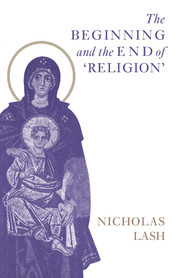Book contents
- Frontmatter
- Contents
- Preface
- PART ONE A MEETING-PLACE FOR TRUTH
- PART TWO EMERGING FROM MODERNITY
- 4 Observation, revelation and the posterity of Noah
- 5 On what kinds of things there are
- 6 Contemplation, metaphor and real knowledge
- 7 When did the theologians lose interest in theology?
- 8 Anselm seeking
- 9 Creation, courtesy and contemplation
- 10 Hollow centres and holy places
- 11 Hoping against hope, or Abraham's dilemma
- 12 Eagles and sheep: Christianity and the public order beyond modernity
- 13 Incarnation and determinate freedom
- 14 Beyond the end of history?
- List of works cited
- Index
13 - Incarnation and determinate freedom
Published online by Cambridge University Press: 05 March 2012
- Frontmatter
- Contents
- Preface
- PART ONE A MEETING-PLACE FOR TRUTH
- PART TWO EMERGING FROM MODERNITY
- 4 Observation, revelation and the posterity of Noah
- 5 On what kinds of things there are
- 6 Contemplation, metaphor and real knowledge
- 7 When did the theologians lose interest in theology?
- 8 Anselm seeking
- 9 Creation, courtesy and contemplation
- 10 Hollow centres and holy places
- 11 Hoping against hope, or Abraham's dilemma
- 12 Eagles and sheep: Christianity and the public order beyond modernity
- 13 Incarnation and determinate freedom
- 14 Beyond the end of history?
- List of works cited
- Index
Summary
FROM DIGNITY TO PLIGHT
The obsession with freedom is a defining feature of the modern Western mind. Even though freedom has not always been the keynote of political action and moral argument, men and women everywhere have sought and celebrated such freedom as lay within their vision and their reach.
It is the correlation between our freedom and the being and action of God which especially interests me. And, on this topic, the dominant ethos in modern Western thought has undergone a series of most interesting modulations. From the locus of our likeness to God, freedom became, first, the goal of our struggle against all absolutes, then the celebration of autonomy won and power displayed, then, gradually, under the pressure of much suffering and disillusionment, something much more modest, more stoical. Finally, in terror, freedom becomes our plight.
In the beginning of modernity was the will. ‘It is a supreme perfection in man that he acts voluntarily, that is, freely; this makes him in a special way the author of his actions and deserving of praise for what he does.’ Thus Descartes, for whom the nature of the will and its freedom is the point of our resemblance to God. As constituted by God we are, like God, the authors of our acts. Freedom is our godlike dignity.
- Type
- Chapter
- Information
- The Beginning and the End of 'Religion' , pp. 237 - 251Publisher: Cambridge University PressPrint publication year: 1996



